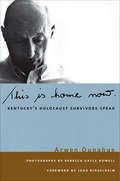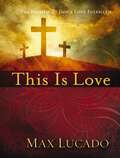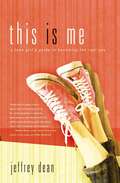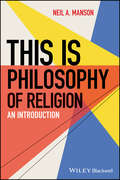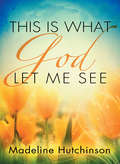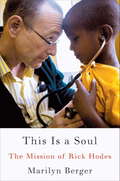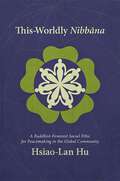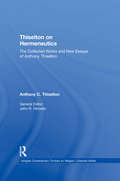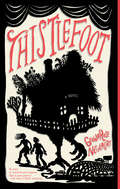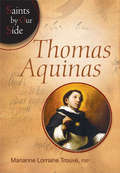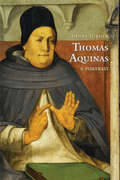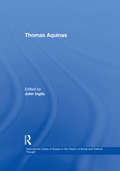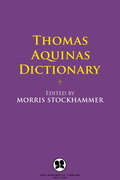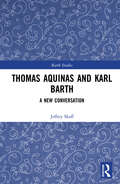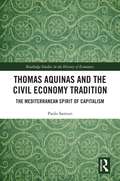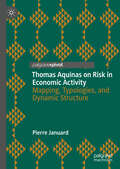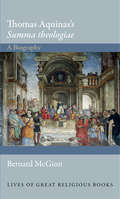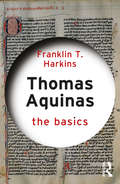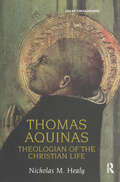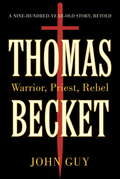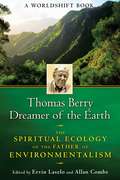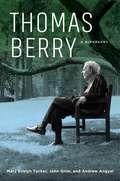- Table View
- List View
This is Home Now: Kentucky's Holocaust Survivors Speak (Kentucky Remembered: An Oral History Series #Kyre)
by Arwen DonahueA look at the lives of nine Jewish Holocaust survivors after their liberation from Nazi concentration camps, when they settled in rural Kentucky.At the end of World War II, many thousands of Jewish Holocaust survivors immigrated to the United States from Europe in search of a new beginning. Most settled in major metropolitan areas, usually in predominantly Jewish communities, where proximity to coreligionists offered a measure of cultural and social support. However, some survivors settled in smaller cities and rural areas throughout the country, including in Kentucky, where they encountered an entirely different set of circumstances. Although much scholarship has been devoted to Holocaust survivors living in major cities, little has been written about them in the context of their experiences elsewhere in America.This Is Home Now: Kentucky’s Holocaust Survivors Speak presents the accounts of Jewish survivors who resettled outside of the usual major metropolitan areas. Using excerpts from oral history interviews and documentary portrait photography, author Arwen Donahue and photographer Rebecca Gayle Howell tell the fascinating stories of nine of these survivors in a unique work of history and contemporary art. The book focuses on the survivors’ lives after their liberation from Nazi concentration camps, illuminating their reasons for settling in Kentucky, their initial reactions to American culture, and their reflections on integrating into rural American life.Praise for This is Home Now“Until Donahue and Howell turned their recorders and cameras on these well-chosen survivors living in Kentucky, no one had taken the time to ask how these solitary transplants made new lives for themselves and their children in rural middle America. The stories and images reproduced in this book are both moving and arresting. We owe Donahue and Howell a great debt for rescuing them before they disappeared down the trapdoor of historical memory.” —Lawrence N. Powell, author of Troubled Memory: Anne Levy, the Holocaust, and David Duke's Louisiana“Each of the stories can stand on its own as a fascinating example of what has transpired for Jews outside of New York City.” —David Wallace, Community (Jewish Community Association of Louisville)“This Is Home Now focuses on the overlooked stories of Holocaust survivors who relocated to the commonwealth.” —Lexington Herald-Leader
This is Love: The Extraordinary Story of Jesus
by Max LucadoJoin Max Lucado as he takes you on a journey into the life of the One who gave Himself to win your heart. Jesus was both divine and human, common yet extraordinary: a one-of-a-kind God-man who befriended sinners and outwitted death. But the truly amazing thing about Him is His love. His love never falters, never withholds. His love never gives up, never stops short. His love goes the distance. With stunning photographs and rich, classic design, This Is Love will steer you on a life-changing voyage through the poignant story of the death, resurrection, and unsurpassed legacy of Christ.
This is Me: A Teen Girl's Guide to Becoming the Real You
by Jeffrey DeanYou want to show the world the real you. But sometimes you’re not sure who the real you really is. (Here’s help. ) Being a teen girl isn’t easy. The pressures, the frustrations, the fears. Some days you just want to disappear. But a voice inside keeps whispering that you were created for an amazing life. And you want it. You long to become the kind of beautiful young woman who can confidently tell the world… “This is me!” So where do you start? Maybe with a helpful handbook to the truth about you. This Is Me: A Teen Girl’s Guide to Becoming the Real Youoffers practical “getting there” advice for teens who want to experience everything God has for their future. Teen authority and counselor Jeffrey Dean has spoken–and listened–to thousands of students just like you. In his new book, he helps you figure out where you are now, then shows you from the Bible how to get where you want to go. This Is Meis packed with street-level reality, surprising humor, hard questions and life-tested answers. For your personal journey from here to extraordinary,This Is Meis the travel companion every girl needs. Check out the companion book:Watch This: A getting-there guide to manhood for teen boys. From the Trade Paperback edition.
This is Philosophy of Religion: An Introduction (This is Philosophy)
by Neil A. MansonA reader-friendly introduction to the essential concepts, theories, and questions in analytic philosophy of religion Does God exist? If so, what is God's relationship to us? Do we have free will? This is Philosophy of Religion surveys foundational topics in the philosophy of religion using a clear and accessible style. Straightforward and easy to comprehend for those with no prior philosophical background, this engaging introduction familiarizes readers with the vocabulary, methods, and major concepts in the philosophy of religion, and invites them to think through questions which arise in the intersection of philosophy, theology, and religious studies. Part of the popular This is Philosophy series, this book applies the basic investigative methods of philosophy to questions of religion, faith, and morality. Chapters offer a framework for thinking about religion, present arguments for and against the existence of God, discuss religious diversity, consider the intellectual co-existence of faith and reason, and examine different theories about why people are religious. Examples and illustrations taken from popular culture reinforce the subject’s contemporary relevance, and are complemented by a wealth of online resources for instructors on the This is Philosophy series site that encourage further reading and strengthen student comprehension of key concepts. A dependable introduction to the philosophy of religion, This is Philosophy of Religion is an ideal gateway to the discipline for readers who want to engage with questions about religion and contemplate the philosophical implications of religious belief.
This is What God Let Me See
by Madeline HutchinsonSince she was a child, Madeline Hutchinson has received dreams and visions from the Lord. A willing vessel, Madeline has been given countless words of encouragement and blessing, instruction and warning for herself, her family, and her friends. But in This Is What God Let Me See, the Lord’s message is intended for a much larger audience: the whole world! In this book, Madeline shares the words your loving heavenly Father wants His precious children to hear. You’ll be encouraged to come humbly before God, and listen to what He has to say.
This is a Soul: The Mission of Rick Hodes
by Marilyn Berger"Whoever Saves a Life, It Is Considered as If He Saved an Entire World"Dr. Rick Hodes arrived in Africa more than two decades ago to help the victims of a famine, but he never expected to call this extremely poor continent his home. Twenty-eight years later, he is still there.This Is a Soul tells the remarkable story of Rick Hodes's journey from suburban America to Mother Teresa's clinic in Addis Ababa, Ethiopia. As a boy, Rick was devoted to helping those in need, and eventually he determined that becoming a doctor would allow him to do the most good. When he heard about famine in Africa, that's where he went, and when genocide convulsed Rwanda, he went into the refugee camps to minister to the victims. When he was told that Ethiopia was allowing its Jews to emigrate to Israel, he went to help. While there, he was drawn to Mother Teresa's mission in Addis Ababa. It was there that Rick found his calling when he began caring for the sickest children in one of the world's poorest countries. But he did more than that—he began taking them into his home and officially adopted five of them. This Is a Soul is also a book filled with great joy and triumph. When Rick's kids return from surgery or life-saving treatments, he is exultant. "Seeing these people after surgery is like going to heaven," he says.Marilyn Berger went to Africa to write about Dr. Hodes, but while there, she became involved with the story. When she came upon a small, deformed, and malnourished boy begging on the street, she recognized immediately that he had the exact disease Rick could cure. She took him to Rick, who eventually arranged for the boy to have a complicated and risky surgery, which turned out to be incredibly successful. The boy's story—intertwined with Rick's, and Marilyn's as well—is unforgettable in its pathos and subtle humor. This Is a Soul is not just a story of the savior and the saved, it is a celebration of love and wisdom, and an exploration of how charity and devotion can actually change lives in an overcrowded, unjust, and often harsh world.
This-Worldly Nibbāna: A Buddhist-Feminist Social Ethic for Peacemaking in the Global Community
by Hsiao-Lan HuOffering a feminist analysis of foundational Buddhist texts, along with a Buddhist approach to social issues in a globalized world, Hsiao-Lan Hu revitalizes Buddhist social ethics for contemporary times. Hu's feminist exegesis references the Nikāya-s from the "Discourse Basket" of the Pāli Canon. These texts, among the earliest in the Buddhist canon, are considered to contain the sayings of the Buddha and his disciples and are recognized by all Buddhist schools. At the heart of the ethics that emerges is the Buddhist notion of interdependent co-arising, which addresses the sexism, classism, and frequent overemphasis on individual liberation, as opposed to communal well-being, for which Buddhism has been criticized. Hu notes the Buddha's challenge to social hierarchies during his life and compares the notion of "non-Self" to the poststructuralist feminist rejection of the autonomous subject, maintaining that neither dissolves moral responsibility or agency. Notions of kamma, nibbāna, and dukkha (suffering) are discussed within the communal context offered by insights from interdependent co-arising and the Noble Eightfold Path. This work uniquely bridges the worlds of Buddhism, feminism, social ethics, and activism and will be of interest to scholars, students, and readers in all of these areas.
Thiselton on Hermeneutics: The Collected Works and New Essays of Anthony Thiselton (Ashgate Contemporary Thinkers on Religion: Collected Works)
by Anthony C. ThiseltonHermeneutics is an interdisciplinary study of how we interpret texts, especially biblical texts, in the light of theories of understanding in philosophy, meaning in literary theory, and of theology. This volume brings together the seminal thought of a leading contemporary pioneer in this field. Thiselton's The Two Horizons was a classic on how horizons of biblical texts engage creatively with the horizons of the modern world. The author's later New Horizons in Hermeneutics explored still more deeply the transforming capacities of biblical texts, while his massive commentary on 1 Corinthians interpreted an epistle. This volume collects many of Anthony Thiselton's more notable writings from some seven books and 70 articles, to which he adds his own re-appraisals of earlier work. It uniquely expounds the thought of a major contemporary British theologian through his own words, and includes his own critical assessments.
Thistlefoot: A Novel
by GennaRose NethercottIn the tradition of modern fairy tales like Neil Gaiman's American Gods and Naomi Novik's Spinning Silver comes an immersive fantasy saga, a debut novel about estranged siblings who are reunited after receiving a mysterious inheritance.&“A wonderfully imaginative, wholly enchanting novel of witness, survival, memory, and family that reads like a fairy tale godfathered by Neil Gaiman and Tim Burton in a wild America alive with wonders and devils alike. Thistlefoot shimmers with magic and mayhem and a thrilling emotional momentum.&” —Libba Bray, bestselling author of The DivinersThe Yaga siblings—Bellatine, a young woodworker, and Isaac, a wayfaring street performer and con artist—have been estranged since childhood, separated both by resentment and by wide miles of American highway. But when they learn that they are to receive an inheritance, the siblings agree to meet—only to discover that their bequest isn&’t land or money, but something far stranger: a sentient house on chicken legs. Thistlefoot, as the house is called, has arrived from the Yagas&’ ancestral home outside Kyiv—but not alone. A sinister figure known only as the Longshadow Man has tracked it to American shores, bearing with him violent secrets from the past: fiery memories that have hidden in Isaac and Bellatine&’s blood for generations. As the Yaga siblings embark with Thistlefoot on a final cross-country tour of their family&’s traveling theater show, the Longshadow Man follows in relentless pursuit, seeding destruction in his wake. Ultimately, time, magic, and legacy must collide—erupting in a powerful conflagration to determine who gets to remember the past and craft a new future. An enchanted adventure illuminated by Jewish myth and adorned with lyrical prose as tantalizing and sweet as briar berries, Thistlefoot is a sweeping epic rich in Eastern European folklore: a powerful and poignant exploration of healing from multi-generational trauma told by a bold new talent.
Thomas Acquinas (Saints by Our Side)
by Marianne Lorraine TrouvéGet to know the complex St. Thomas Aquinas in this approachable biography. Written by an author who admires and relates to him as a friend, readers will engage with the saint and his works through the warmly told stories of his life. The book also includes guidance on how to read an article of the Summa, reflection questions, and a prayer to the famous saint. This narrative illuminates St. Thomas’ spiritual legacy and why he is such an important figure in our Church.
Thomas Aquinas
by Denys TurnerLeaving so few traces of himself behind, Thomas Aquinas seems to defy the efforts of the biographer. Highly visible as a public teacher, preacher, and theologian, he nevertheless has remained nearly invisible as man and saint. What can be discovered about Thomas Aquinas as a whole? In this short, compelling portrait, Denys Turner clears away the haze of time and brings Thomas vividly to life for contemporary readers--those unfamiliar with the saint as well as those well acquainted with his teachings.Building on the best biographical scholarship available today and reading the works of Thomas with piercing acuity, Turner seeks the point at which the man, the mind, and the soul of Thomas Aquinas intersect. Reflecting upon Thomas, a man of Christian Trinitarian faith yet one whose thought is grounded firmly in the body's interaction with the material world, a thinker at once confident in the powers of human reason and a man of prayer, Turner provides a more detailed human portrait than ever before of one of the most influential philosophers and theologians in all of Western thought.
Thomas Aquinas (International Library of Essays in the History of Social and Political Thought)
by John InglisThis volume contains the seminal articles that define the influence of Aquinas within legal philosophical thought. A comprehensive reference for those new to the field, it covers such topics as the relation of virtue to law, the common good, natural law, natural rights and property rights; together with social and political issues like abortion, feminism, homosexuality, environment, civil disobedience and just war. Attention is devoted to the new natural law theory and its limitations, as well as the place of historical context in the recovery of social thought.
Thomas Aquinas - Selected Writings
by Ralph Mcinerny Thomas AquinasIn his reflections on Christianity, Saint Thomas Aquinas forged a unique synthesis of ancient philosophy and medieval theology. Preoccupied with the relationship between faith and reason, he was influenced both by Aristotle's rational world view and by the powerful belief that wisdom and truth can ultimately only be reached through divine revelation. Thomas's writings, which contain highly influential statements of fundamental Christian doctrine, as well as observations on topics as diverse as political science, anti-Semitism and heresy, demonstrate the great range of his intellect and place him firmly among the greatest medieval philosophers. For more than seventy years, Penguin has been the leading publisher of classic literature in the English-speaking world. With more than 1,700 titles, Penguin Classics represents a global bookshelf of the best works throughout history and across genres and disciplines. Readers trust the series to provide authoritative texts enhanced by introductions and notes by distinguished scholars and contemporary authors, as well as up-to-date translations by award-winning translators.
Thomas Aquinas Dictionary
by Morris StockhammerRanking among the most comprehensive systematicians of theological thought, Thomas Aquinas, the bulwark of Scholasticism, looked into virtually every corner of the theological edifice. There are two sorts of . . . This and phrases similar to it are constant expressions repeated on almost every page of St. Thomas' masterwork, Summa Theologiae. They are vivid reflections of his investigative method, a method that consisted of a broad and liberal vision which scrutinized all facets of every issue considered by him throughout his writings. It would be presumptuous at best to expect to extract all the decisive passages from the vast body of Aquinas' literature. And yet, without the hope of possibly accomplishing this task, one could not endeavor to compile a dictionary on Thomas Aquinas. Thus, in the preparation of this volume, the editor constantly reminded himself of Rickaby's admonition:St. Thomas is an author peculiarly liable to misrepresentation by taking his words in one place to the neglect of what he says on the same subject elsewhere. No one is safe in quoting him who has not read much of him. Naturally, the dictionary is organized with this in mind. Professor Stockhammer has sought to make misrepresentation a moot point and to distill and deliver the Thomist philo-theology within the framework of its essentials. In addition, only entries that are of interest to the modern reader are included, whereas items of merely medieval concern are omitted. The volume contains an excellent introduction by Professor Theodore E. James, and will take its place beside other dictionaries, such as Aristotle Dictionary and Plato Dictionary, as an invaluable handbook for students, teachers and interested readers alike.
Thomas Aquinas and Karl Barth: A New Conversation (Barth Studies)
by Jeffrey SkaffThis book argues for substantial and pervasive convergence between Thomas Aquinas and Karl Barth with regards to God’s relation to history and to the Christocentric orientation of that history. In short, it contends that Thomas can affirm what Barth calls "the humanity of God." The argument has great ecumenical potential, finding fundamental agreement between two of the most important figures in the Reformed and Roman Catholic traditions. It also contributes to contemporary theology by demonstrating the fruitfulness of exchanging metaphysical vocabularies for normative. Specifically, it shows how an account of God’s mercy and justice can resolve theological debates most assume require metaphysical speculation.
Thomas Aquinas and the Civil Economy Tradition: The Mediterranean Spirit of Capitalism (Routledge Studies in the History of Economics)
by Paolo SantoriDelving into the history of economic thought, this book presents a picture of the Mediterranean spirit of capitalism, a tradition that has its protagonists in Thomas Aquinas and the eighteenth-century civil economy, and seeks to understand its presence and relevance for contemporary societies. The book argues that it is reductive to attribute to the ‘Protestant ethic’ the different formations of capitalism in the Western world. Instead, it is vital to acknowledge the differences in the ways in which the market is lived, enterprises are created and conducted, and civic life in general is understood in different regions. This thought-provoking study demonstrates that in Southern Europe, the legacy of Aquinas and the civil economy adds different terms to those recurring in classical and neo-classical economy: common good, reciprocity, virtue, public trust, mutual assistance, and public happiness. It is these ideas of a market as a place for mutual assistance which can be said to characterize the Mediterranean spirit of capitalism. Thomas Aquinas and the Civil Economy Tradition will be of interest to advanced students and researchers in the history of economic thought, economic philosophy, Christian ethics, and moral theology.
Thomas Aquinas on Moral Wrongdoing
by Colleen MccluskeyMedieval thinkers were both puzzled and fascinated by the capacity of human beings to do what is morally wrong. In this book, Colleen McCluskey offers the first comprehensive examination of Thomas Aquinas' explanation for moral wrongdoing. Her discussion takes in Aquinas' theory of human nature and action, and his explanation of wrong action in terms of defects in human capacities including the intellect, the will, and the passions of the sensory appetite. She also looks at the notion of privation, which underlies Aquinas' account of wrongdoing, as well as his theory of the vices, which intersects with his basic account. The result is a thorough exploration of Aquinas' psychology which is both accessible and illuminating, and will be of interest to a wide range of readers in Aquinas studies, medieval philosophy, the history of theology, and the history of ideas.
Thomas Aquinas on Risk in Economic Activity: Mapping, Typologies, and Dynamic Structure
by Pierre JanuardThis book provides a detailed look at Thomas Aquinas’s view and understanding of economic activity. The work of Aquinas, one of the greatest thinkers of the Middle Ages, is contextualised within his own experiences, the history of the era, and the socio-economic changes underway in 13th-century Europe. Particular attention is paid to Aquinas’s approach to risk, mapping out the different forms of risk he addresses, establishing typologies, and presenting it as a dynamic structure. This book offers unique insight into the economic work of Thomas Aquinas. It will be relevant to students and researchers interested in the history of economic thought, economic analysis of risk, medieval studies, philosophy, and theology.
Thomas Aquinas on War and Peace
by Gregory M. ReichbergInquiring 'whether any war can be just', Thomas Aquinas famously responded that this may hold true, provided the war is conducted by a legitimate authority, for a just cause, and with an upright intention. Virtually all accounts of just war, from the Middle Ages to the current day, make reference to this threefold formula. But due in large measure to its very succinctness, Aquinas's theory has prompted contrasting interpretations. This book sets the record straight by surveying the wide range of texts in his literary corpus that have bearing on peace and the ethics of war. Thereby emerges a coherent and nuanced picture of just war as set within his systematic moral theory. It is shown how Aquinas deftly combined elements from earlier authors, and how his teaching has fruitfully propelled inquiry on this important topic by his fellow scholastics, later legal theorists such as Grotius, and contemporary philosophers of just war.
Thomas Aquinas's Summa theologiae: A Biography (Lives of Great Religious Books #41)
by Bernard McGinnThe life and times of the most important theological work of medieval ChristendomThis concise book tells the story of the most important theological work of the Middle Ages, the vast Summa theologiae of Thomas Aquinas, which holds a unique place in Western religion and philosophy. Written between 1266 and 1273, the Summa was conceived by Aquinas as an instructional guide for teachers and novices and a compendium of all the approved teachings of the Catholic Church. It synthesizes an astonishing range of scholarship, covering hundreds of topics and containing more than a million and a half words—and was still unfinished at the time of Aquinas's death.Here, Bernard McGinn, one of today’s most acclaimed scholars of medieval Christianity, vividly describes the world that shaped Aquinas, then turns to the Dominican friar’s life and career, examining Aquinas’s reasons for writing his masterpiece, its subject matter, and the novel way he organized it. McGinn gives readers a brief tour of the Summa itself, and then discusses its reception over the past seven hundred years. He looks at the influence of the Summa on such giants of medieval Christendom as Meister Eckhart, its ridicule during the Enlightenment, the rise and fall of Neothomism in the nineteenth and twentieth centuries, the role of the Summa in the post–Vatican II church, and the book’s enduring relevance today.Tracing the remarkable life of this iconic work, McGinn’s wide-ranging account provides insight into Aquinas’s own understanding of the Summa as a communication of the theological wisdom that has been given to humanity in revelation.
Thomas Aquinas: The Basics (The Basics)
by Franklin T. HarkinsThomas Aquinas: The Basics is an engaging introduction to the theology of arguably the greatest theologian and philosopher of the Middle Ages. The sophistication and complexity of his thought can be daunting for those approaching his work for the first time. Through this lively and accessible book, Harkins provides an entry point to understanding Aquinas’s mature theological thought. As well as giving an overview of Aquinas’s life and written works, this book examines Aquinas’s understanding of: • the nature and purpose of theology; • God’s nature, existence, and operations; • the Trinity; • creation; • evil; • the human person, human happiness, and the virtues; • Christ and salvation; and • the sacraments. Including a useful glossary of key terms, this text is ideal for students and interested non-specialists seeking an understanding of the theology of Aquinas.
Thomas Aquinas: Theologian of the Christian Life (Great Theologians Series)
by Nicholas M HealyThe work of Thomas Aquinas (1224-1275) has become increasingly influential in recent doctrinal theology and theological ethics, aside from his extraordinary historical significance. Thomas has been read ever since his death, today as much as ever. What is it that distinguishes his work, and can his theological judgments and proposals still be brought to bear in contemporary theological inquiry? This book presents a new study of Thomas Aquinas, focusing on the evangelical, pastoral and theocentric character of his premodern theology. Healy presents Thomas as first and foremost a theologian of the Christian life, who when he used philosophical concepts did so in order to fulfill the task of theology, which he conceived as an ecclesial discipline dedicated above all to helping Christians follow Jesus Christ. Thomas's interpretation of Scripture and his theological method, his Trinitarian ontology, his Christology and his Christological anthropology, conception of the church and sacramental theology, are all examined from this perspective. The richness and complexity yet profound simplicity of the Christian way of life Thomas reveals is shown to make a valuable contribution to the thought of contemporary readers, and the significance of Thomas's writings for contemporary theological questions and concerns is revealed.
Thomas Becket
by John GuyA revisionist new biography reintroducing readers to one of the most subversive figures in English history--the man who sought to reform a nation, dared to defy his king, and laid down his life to defend his sacred honor NEW YORK TIMES BESTSELLER * NAMED ONE OF THE BEST BOOKS OF THE YEAR BY KANSAS CITY STAR AND BLOOMBERGBecket's life story has been often told but never so incisively reexamined and vividly rendered as it is in John Guy's hands. The son of middle-class Norman parents, Becket rose against all odds to become the second most powerful man in England. As King Henry II's chancellor, Becket charmed potentates and popes, tamed overmighty barons, and even personally led knights into battle. After his royal patron elevated him to archbishop of Canterbury in 1162, however, Becket clashed with the King. Forced to choose between fealty to the crown and the values of his faith, he repeatedly challenged Henry's authority to bring the church to heel. Drawing on the full panoply of medieval sources, Guy sheds new light on the relationship between the two men, separates truth from centuries of mythmaking, and casts doubt on the long-held assumption that the headstrong rivals were once close friends. He also provides the fullest accounting yet for Becket's seemingly radical transformation from worldly bureaucrat to devout man of God. Here is a Becket seldom glimpsed in any previous biography, a man of many facets and faces: the skilled warrior as comfortable unhorsing an opponent in single combat as he was negotiating terms of surrender; the canny diplomat "with the appetite of a wolf" who unexpectedly became the spiritual paragon of the English church; and the ascetic rebel who waged a high-stakes contest of wills with one of the most volcanic monarchs of the Middle Ages. Driven into exile, derided by his enemies as an ungrateful upstart, Becket returned to Canterbury in the unlikeliest guise of all: as an avenging angel of God, wielding his power of excommunication like a sword. It is this last apparition, the one for which history remembers him best, that will lead to his martyrdom at the hands of the king's minions--a grisly episode that Guy recounts in chilling and dramatic detail. An uncommonly intimate portrait of one of the medieval world's most magnetic figures, Thomas Becket breathes new life into its subject--cementing for all time his place as an enduring icon of resistance to the abuse of power.From the Hardcover edition.
Thomas Berry, Dreamer of the Earth: The Spiritual Ecology of the Father of Environmentalism
by Ervin Laszlo Allan CombsA tribute to the visionary contributions and prophetic writings of Thomas Berry, spiritual ecologist and father of environmentalism • Contains 10 essays by eminent philosophers, thinkers, and scientists in the field of ecology and sustainability, including Matthew Fox, Joanna Macy, Duane Elgin, Sean Esbjörn-Hargens, Ervin Laszlo, and Allan Combs • Calls for a transformation of consciousness to resolve today’s global ecological and human challenges • Includes a little-known but essential essay by Thomas Berry When cultural historian and spiritual ecologist Thomas Berry, described by Newsweek magazine as “the most provocative figure among the new breed of eco-theologians,” passed away in 2009 at age 94, he left behind a dream of healing the “Earth community.” In his numerous lectures, books, and essays, Berry proclaimed himself a scholar of the earth, a “geologian,” and diligently advocated for a return to Earth-based spirituality. This anthology presents 10 essays from leading philosophers, scientists, and spiritual visionaries--including Matthew Fox, Joanna Macy, Duane Elgin, Sean Esbjörn-Hargens, Ervin Laszlo, and Allan Combs--on the genius of Berry’s work and his quest to resolve our global ecological and spiritual challenges, as well as a little-known but essential essay by Berry himself. Revealing Berry’s insights as far ahead of their time, these essays reiterate the radical nature of his ideas and the urgency of his most important conclusion: that money and technology cannot solve our problems, rather, we must reestablish the indigenous connection with universal consciousness and return to our fundamental spontaneous nature--still evident in our dreams--in order to navigate our ecological challenges successfully.
Thomas Berry: A Biography (G - Reference, Information And Interdisciplinary Subjects)
by Mary Evelyn Tucker John Grim Andrew AngyalThomas Berry (1914–2009) was one of the twentieth century’s most prescient and profound thinkers. As a cultural historian, he sought a broader perspective on humanity’s relationship to the earth in order to respond to the ecological and social challenges of our times. This first biography of Berry illuminates his remarkable vision and its continuing relevance for achieving transformative social change and environmental renewal.Berry began his studies in Western history and religions and then expanded to include Asian and indigenous religions, which he taught at Fordham University, Barnard College, and Columbia University. Drawing on his explorations of history, he came to see the evolutionary process as a story that could help restore the continuity of humans with the natural world. Berry urged humans to recognize their place on a planet with complex ecosystems in a vast, evolving universe. He sought to replace the modern alienation from nature with a sense of intimacy and responsibility. Berry called for new forms of ecological education, law, and spirituality, as well as the creation of resilient agricultural systems, bioregions, and ecocities. At a time of growing environmental crisis, this biography shows the ongoing significance of Berry’s conception of human interdependence with the earth as part of the unfolding journey of the universe.
